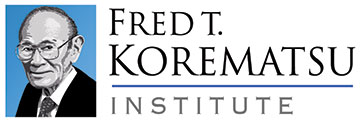The Fred T. Korematsu Institute Reflects on December 7
December 7, 1941, was a day of loss. 2,403 people lost their lives and 1,178 were injured in the attack on Pearl Harbor leaving an indelible mark on our collective history. Aircraft and the USS Arizona and USS Utah battleships were destroyed, families were devastated, and a nation was left in disbelief. It is often marked as the United States’ final push to join the war effort followed by three more years of fighting.
But as Pearl Harbor was rebuilt, the embers of fear, racism, and bigotry against Asian Americans were already smoldering in this country. In response to the horror of Pearl Harbor, President Franklin D. Roosevelt issued Executive Order 9066. With this order, over 125,000 people of Japanese descent living on the West Coast – over two-thirds of whom were American citizens by birth – were forced to leave their homes and communities, lose their livelihoods, and be sent to incarceration camps spread out across the country. This painful moment in history is woven deeply into the fabric of our American story and has lingering effects on us all. In a pivotal moment in U.S. civil rights history, Fred Korematsu, Gordon Hirabayashi, and Minor Yasui all challenged Executive Order 9066 and took their fight for justice all the way to the Supreme Court.
On this day, decades after the destruction of Pearl Harbor, we have seen numerous examples of xenophobia, racism, hatred, and the establishment of an “us” vs. “them” rhetoric and mentality popping up in politics and popular culture. We saw this in the reaction to the integration of schools in the 1950s, then in the discrimination against Muslim Americans and Sikhs following 9/11, and in the hate speech and violence towards the Asian American community in reaction to the COVID-19 pandemic in 2020. The discrimination can be quiet and lingering in reinforcing a negative, unwarranted stereotype about a community. It can be inflamed by a hateful comment from a passing stranger or by a political pundit at the highest level of office. It can be silent like a child’s tears from hearing a racial slur or shocking like an assault of an elder sitting in a bus shelter or terrifying like a lynching, a murder, or a massacre at a place of work or worship with blood on the walls left as the only reminder.
At the Korematsu Institute, we believe prejudice, xenophobia, and racism are born of ignorance. And the best way we can fight that—the most powerful tool we have—is education. We should celebrate our differences, we should share our culture’s accomplishments and contributions to history, and we should talk openly about racism, homophobia, and sexism when we witness it. We can all work together for a future where xenophobia and hate speech, lack of civics education and engagement, and racial inequity are a thing of the past.
On a day like December 7, 1941, we should reflect on the loss of life, the destruction, and the resulting horrors of that day. And as we honor the lives lost and the lingering scars on communities, we hope on this day of reflection there can be some thoughtful contemplation. Contemplation on the beauty and power in all of our diverse communities that make up this country and that we are encouraged to advocate for fair treatment and social justice for all, and as Fred Korematsu said, to “stand up for what is right, and don’t be afraid to speak up” when we see the sparks of fear that lead to discrimination.
